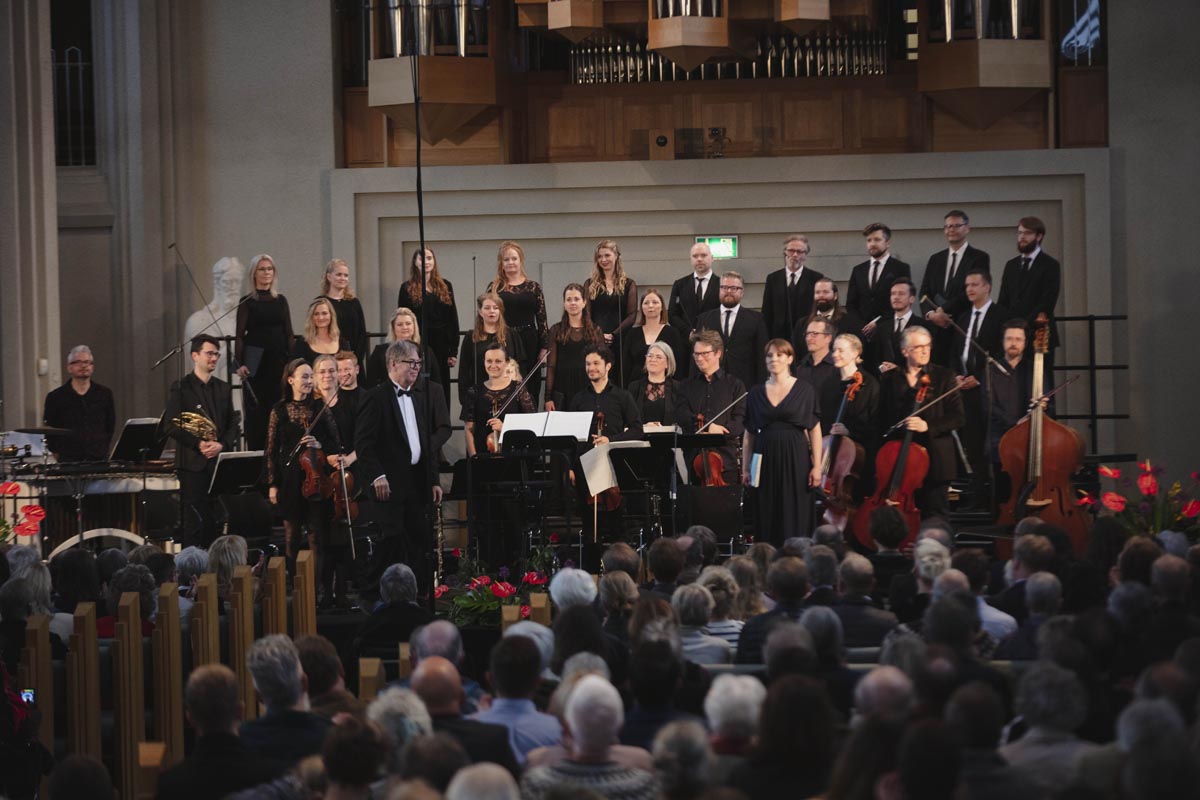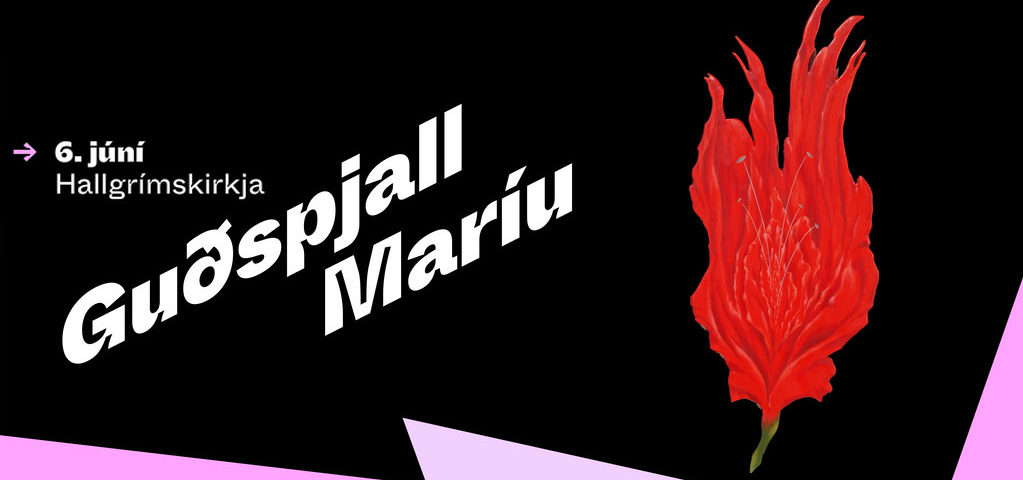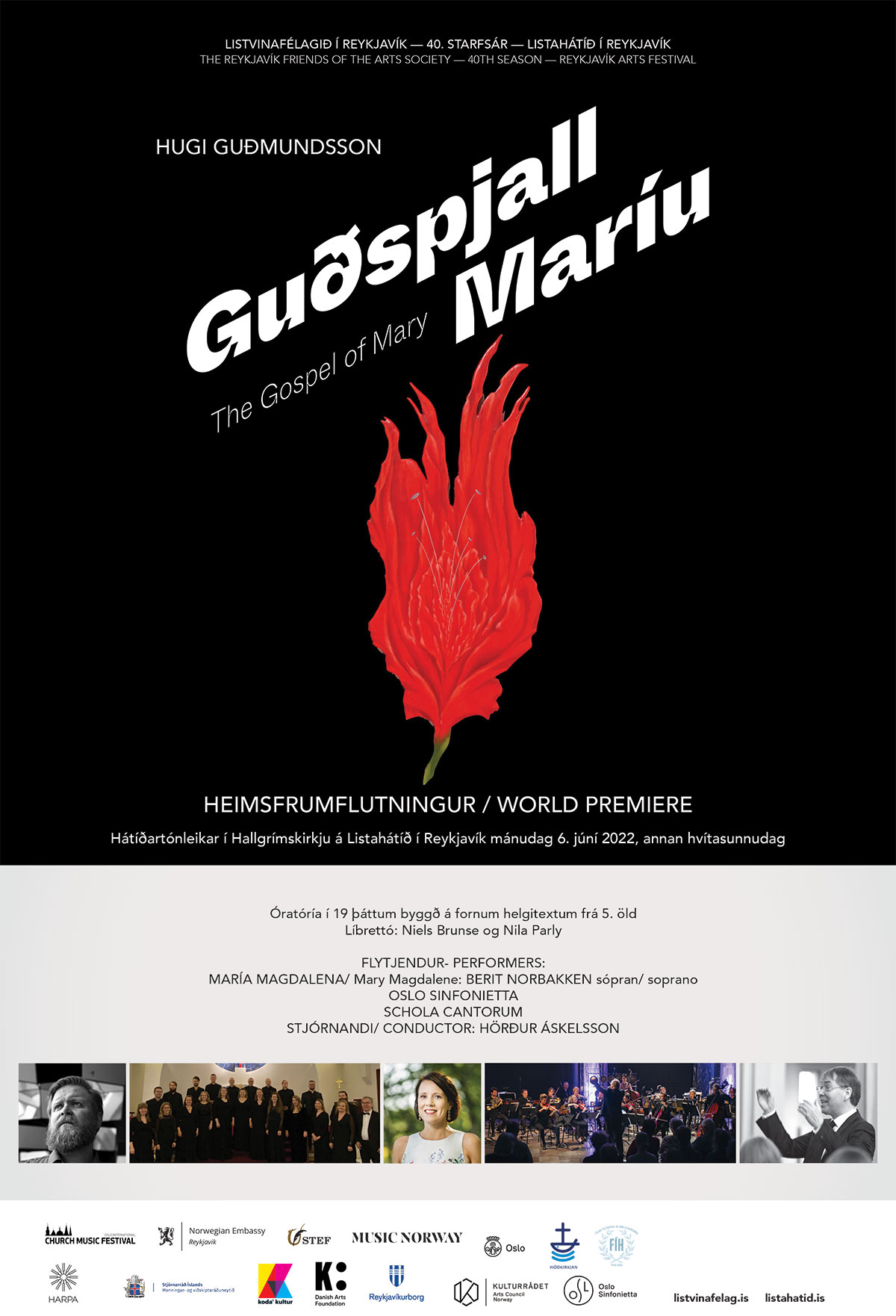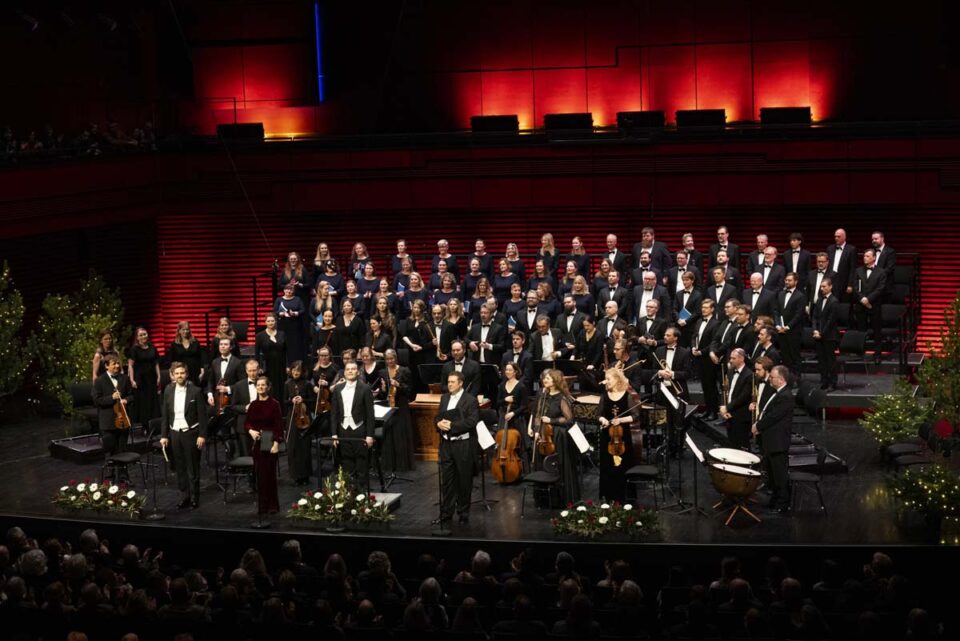COMPLETE READING OF THE HYMNS OF THE PASSION BY HALLGRÍMUR PÉTURSSON
08/04/2022
Photos: The Gospel of Mary by composer Huga Guðmundsson – world premiere June 6 2022 in Hallgrímskirkja Reykjavik
07/06/2022World premiere of a new oratorio THE GOSPEL OF MARY by composer Hugi Guðmundsson June 6 at 8 PM in Hallgrimskirkja
The Gospel of Mary is a new and magnificent oratorio by Hugi Guðmundsson, one of Iceland’s foremost contemporary composers. Nila Parly and Niels Brunse’s libretto is largely based on a 5th century eponymous sacred text, believed to have been kept secret since it jarred with the Christian orthodoxy of those times. It is an unconventional and progressive interpretation of Christ’s message as a path to inner wisdom, rejecting death and suffering as ways to achieve eternal life. The gospel hints at Mary Magdalene having been an apostle, a truly volatile idea. This ancient gospel strongly resonates with our modern times, while the composer elevates it into a timeless space.
The work is performed by a group of outstanding musicians: Schola Cantorum, Oslo Sinfonietta and Berit Norbakken, conducted by Hörður Áskelsson who commissioned the oratorio on behalf of the Friends of the Arts Society, original commissions being at the heart of the society’s work. Berit Norbakken is one of Norway’s best-known sopranos and has performed around the world, including in the Sydney Opera House and Tokyo Opera Palace.
Hugi Guðmundsson is one of the foremost representatives of Icelandic contemporary music, and an increasingly important name on the Nordic music scene. He was nominated twice for the Nordic Council Music Prize, including for the critically acclaimed opera Hamlet in Absentia. Guðmundsson is educated as a composer at Reykjavik College of Music and Royal Danish Academy of Music, where he studied with Bent Sørensen, Niels Rosing-Schow and Hans Abrahamsen. He took his second master’s degree at the Sonology Institute in The Hague, in electronic music and computer music. Guðmundsson is particularly known for his a cappella works, but has also written music for solo instruments and orchestra. In recent years, major works have become a larger part of his production, both concerts and opera, resulting in several awards and praise from critics.
Hörður Áskelsson is an award-winning conductor and organist, originally from Akureyri in northern Iceland. Áskelsson began as cantor in Hallgrímskirkja in Reykjavik in 1982. He established the Motet Choir in 1982 (formerly the Hallgrimskirkja Motet Choir) and the chamber choir Schola Cantorum 1996 which have both achieved international recognition. He is also the man behind the Festival of the Sacred Arts and Friends of the Arts Society. The Icelandic conductor has received several music awards at home and abroad, and was awarded the Knight’s Cross from the Icelandic Falcon Order for his work.
Schola Cantorum was established in 1996 by Hallgrimskirkja’s cantor Hörður Áskelsson, who is still the conductor of the choir. In addition to a repertoire of Renaissance and Baroque music, Schola Cantorum performs a great deal of contemporary music, and has premiered many works by contemporary Icelandic composers. The choir was named the official music ensemble of the city of Reykjavik in 2006, won awards in choral competitions in France and Italy, and was nominated for the Nordic Music Prize. They have also collaborated with Hague International Baroque Orchestra, now the Reykjavik International Baroque Orchestra, as well as the singer Björk and the band Sigur Rós.
Oslo Sinfonietta is Norway’s oldest active contemporary music ensemble. The ensemble consists of freelance musicians and members of some of Norway’s most prominent orchestras, such as the Oslo Philharmonic, Norwegian Radio Orchestra, Norwegian National Opera Orchestra and Norwegian Chamber Orchestra. Christian Eggen is conductor and artistic director. Oslo Sinfonietta performs regularly at Norwegian and international festivals and collaborates with a number of leading composers. In autumn 2015, Oslo Sinfonietta was awarded the Critics’ Prize for the project Lachenmann! from June the same year.
Berit Norbakken is among the elite of Norwegian sopranos. In addition to being chosen often as a soloist in oratorios, passions and masses, she has held several solo concerts at a number of festivals in Norway. In recent years she has also performed in operas with great success, most recently in a new stage production of Bach’s St John Passion, directed by Calixto Bieito, at Theatro Arriaga in Bilbao. She is a regular soloist with leading orchestras and conductors at major concert venues, such as the Sydney Opera House and Tokyo Opera City Hall with conductors such as Robert King, Daniel Reuss, Erik Nielsen, Mikhael Pletnev, Andreas Spering, Olof Boman and Ottavio Dantone.
Niels Brunse is a writer and translator. He has translated over 200 works from English, German and Russian, including a wide range of plays by classical and modern playwrights, primarily Shakespeare, but also Chekhov, Kleist, Pinter, Beckett, Brecht, Dürrenmatt, Tennessee Williams and others. Brunse has written novels, short stories, song lyrics and drama, and recently finished a complete re-translation of Shakespeare’s plays. He has received several literary prizes, including the honorary prize from the Wilhelm Hansen Foundation and the Literature Prize from Weekendavisen.
Nila Parly is a librettist and opera dramaturg. Since 2005, she has participated in a number of productions, including at the Royal Opera in Copenhagen. Parly was a dramaturg in the production of Niels Marthinsen’s Skriftestolen (The Pulpit) at the Jutland Opera in 2007, which received the Reumert Prize as “Best Musical Theatre” the same year. Nila Parly is also a trained opera singer, and entitled her doctoral dissertation Vocal Victories: Richard Wagner’s Female Characters from Senta to Kundry at the University of Copenhagen, Department of Arts and Cultural Studies.



